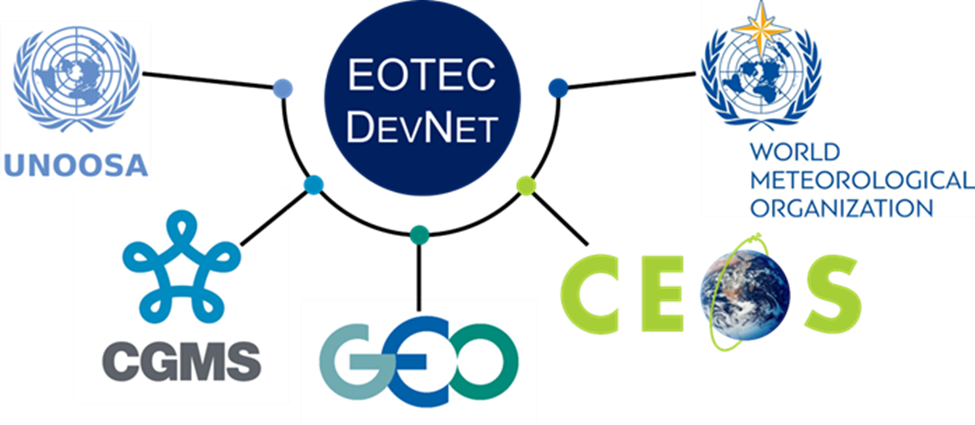EOTECDevNet: a network of networks in Earth observation capacity building

EOTEC DevNet, the Earth Observation Training, Education, and Capacity Development Network was created in 2021 to serve as a global platform to harness the power of satellite-derived Earth information, making it accessible to a broader audience.
The primary objective of the network is to foster collaboration and coordination among various stakeholders in EO-related capacity building. With the aim to make training and tools more accessible, share knowledge, and promote best practices, the entity strives to increase the use of Earth observation data in decision-making processes related to climate change and disaster management.
Its founding members comprise representatives from key space and weather agencies, along with their respective capacity-building divisions. These include the World Meteorological Organization (WMO) Education and Training Programme, the joint WMO-Coordination Group for Meteorological Satellites (CGMS) Virtual Laboratory for Training & Education in Satellite Meteorology, the United Nations Office for Outer Space Affairs (UNOOSA) and its Earth Observation-related initiatives, the Group on Earth Observations (GEO) and its Capacity Development Working Group, as well as the Committee on Earth Observation Satellites (CEOS) and its Working Group on Capacity Building and Data Democracy.
The idea of cooperation between members emerged from the need to eliminate duplication of efforts, leverage existing resources, and fill gaps in EO capacity building. By working together, the network envisages to increase collective impact and outreach.
In doing so, EOTEC DevNet takes a unique approach: working through a global task team and four regional communities of practice, the network serves as a centralized hub connecting stakeholders from national and regional institutions to global organizations. Such architecture is designed to fill gaps, leverage existing resources, and promote best practices, thereby creating a more efficient and effective ecosystem for Earth observation and capacity building.
The products offered by the network are specifically conceived to address the capacity-building needs in the field of Earth observation related to climate change and disaster management. A range of tools and resources are developed in collaboration with partners and members with the goal of making Earth observation data more accessible and actionable. These include training calendars, use cases, webinar recordings, and specialized tool trackers like the Floods Tool tracker. Each of these products addresses distinct needs, from skill development to decision-making support, thereby contributing to the overall capacity building in Earth observation.
The target audience of the EOTECDevNet includes capacity development managers, trainers, educators, and professionals, as well as subject matter experts with a focus on EO-related capacity building. Additionally, the objective lies in connecting with decision-makers and end-users who stand to benefit from Earth observation data in the pursuit of Sustainable Development Goals, climate change mitigation, and disaster risk reduction.
Capacity-building tools for Disaster Risk Reduction
A carefully curated suite of capacity-building tools for Disaster Risk Reduction aimed at harnessing the power of Earth observation encompasses Flood Tools Tracker (a comprehensive database of existing flood management tools and associated training materials), use cases, specialized training opportunities, and webinar recordings focused on flood monitoring.
Additionally, the process of establishing a drought working group that will develop capacity-building tools to facilitate easier access to EO tools and resources is in progress. These resources are frequently developed in partnership with EOTEC DevNet members and partners, all with the goal of delivering actionable insights and effective solutions for disaster management.
Benefits of joining the network
By joining EOTEC DevNet, members can connect with global and regional experts, access specialized resources, influence training priorities in their region, and find opportunities for collaboration and partnership.
Interested organizations can easily get in touch with the Secretariat by visiting the official website or reaching out via social media (Twitter or LinkedIn). One of the most direct ways to engage is by joining one of the Communities of Practice, which are organized across four regions (Africa, Americas, Asia&Oceania, and Europe), or by participating in our thematic working groups (Floods or Drought, Climate adaptation in development). This provides a platform for active collaboration, knowledge sharing, and setting regional training priorities.
